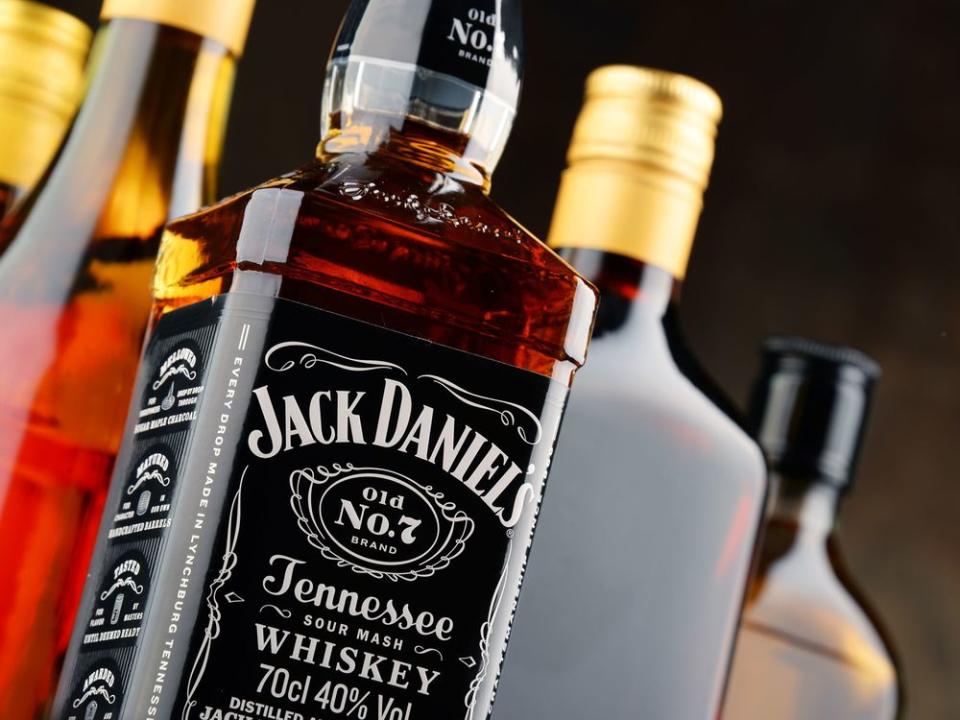Jack Daniel's Doesn't Plan to Raise Prices, Despite E.U. Tariffs
When President Trump slapped tariffs on European steel and aluminum in the summer of 2018, the European Union responded by putting its own 25 percent tariffs on a range of U.S.-made products, including Harley Davidson motorcycles, bourbon, and whiskey.
That retaliatory behavior was expected to hit Brown-Forman especially hard. The Louisville, Kentucky company produces as much as 60 percent of the country's whiskey exports through its brand portfolio that includes both Jack Daniel's and Woodford Reserve.

"It's a tough situation," Brown-Forman CEO Lawson Whiting said at the time. "We view these tariffs really from the EU as a targeted campaign right at Brown-Forman, an American business headquartered in Kentucky."
The Associated Press reported that, if the tariffs remained in place, American companies would have to decide whether to increase the price of their products in Europe and risk losing their customer base, or absorbing the cost with the understanding that it could decrease profits.
Despite the fact that the tariffs have cost the company some $125 million per year, Brown-Forman has—so far—been able to take on the expense without raising prices, in Europe or in the United States. "We continue to deliver solid underlying growth from both a geographic and portfolio perspective, despite the uncertain global economic and geopolitical environment," Whiting said on Thursday.
"We continue to build our business for the long-term. Our takeaway trends remain healthy in many major markets as we continue to invest in consumer momentum by absorbing most tariff-related costs. We believe this, coupled with increased investments in advertising and route-to-consumer changes in certain markets, position us well for the next generation of growth."
According to CNN Business, overall Brown-Forman sales in the United States have increased 10 percent over a year ago. Bourbon sales have jumped by 22 percent, and tequila sales have also risen by 11 percent. (Brown-Forman also owns three tequila brands: Herradura, El Jimador, and Pepe Lopez.) Its premium brand, Gentleman Jack, also sold 900,000 cases worldwide during the first half of the 2020 fiscal year.
That's not to say that every company has been able to handle the tariff-related downturn as well as Brown-Forman. Amir Peay, the owner of Lexington distillery James E. Pepper, has said that the tariffs had cost him hundreds of thousands of dollars in revenue, and its expansion into the United Kingdom was delayed for nine months after a distributor got cold feet.
"We're collateral damage," Peay told Bloomberg in November. "We need stability. I can't make long-term decisions about capital allocation, about hiring people, about where to grow my business if I don't have certainty and stability. We have none of that."
Scott Harris, the founder of the Catoctin Creek distillery in Virginia, told the New York Times that he expected 25 percent of his sales to come from Europe last year. That didn't happen, and neither did the distillery's expansion plan. "We presently are treading water," he said earlier this year.
Meanwhile, Brown-Forman is trying to make up for decreasing sales in Europe by pushing its newest projects here in the U.S. The company has also boosted its advertising budget by 10 percent, largely to promote the arrival of Jack Daniel's third flavored whiskey, Jack Daniel's Tennessee Apple. "It tastes really, really good," Whiting said, adding that they expect it to be popular outside the U.S., as it's not the most common flavor combination.
Looking ahead, the company expects that its net sales will continue to increase by single-digits, while its premium bourbon brands and its tequilas are expected to see double-digit sales increases.
We're not saying that it could be because everyone seems to drink more during an election year, but everyone seems to drink more during an election year.

